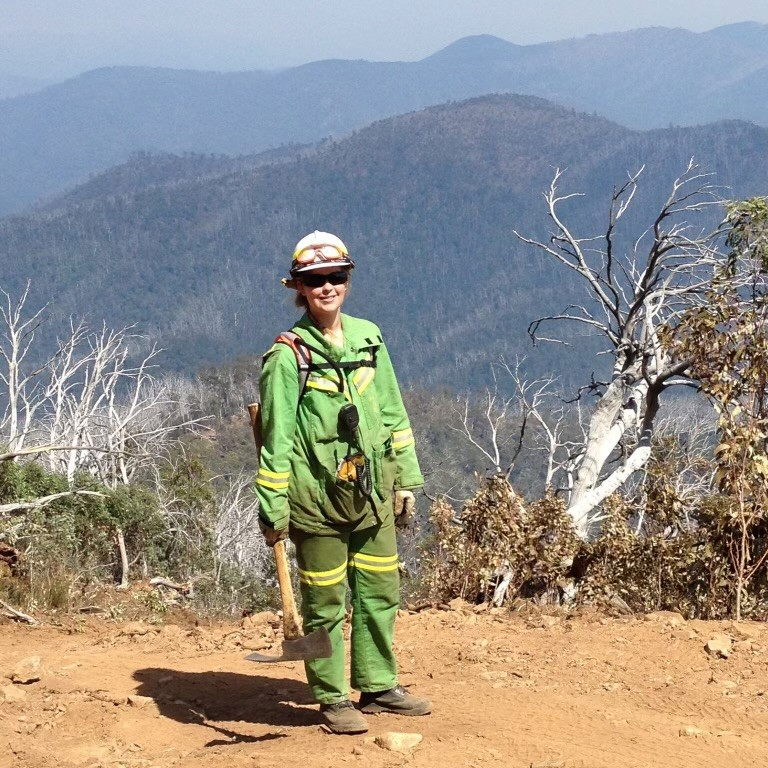
Emma Welsby started volunteering for the CFA in Lima South, near Lake Nillahcootie in the state’s north east when she was just 14 and started fighting fires at 16.
‘My whole family were CFA volunteers. It was a bit of a rite of passage that you would contribute to your local community in that way.’
After completing a Science degree at Monash University, Emma joined DEECA (then Department of Sustainability and Environment) through its science graduate program in 2011. The program saw her working in fire management roles across Victoria, including in Bendigo, Foster and then back near where she grew up in Benalla.
‘I was doing things like burn planning, fire severity mapping projects but also getting out into the forest and fighting fires.’
‘Having an emergency role is something that attracted me to work at the department.’
Now a manager of a bushfire policy team in the Office of Bushfire Risk Management, it remains so.
‘It’s really important to me to have the on-ground connection and to know what’s happening at that community and operational level.’
Emma’s current emergency (fire) role is as a trainee Operations Officer.
‘I am based out of Warrandyte for my fire role. Every third weekend I am on standby and need to be within 30 minutes of the depot there.
‘As an operations officer you are responsible for coordinating a response to smaller incidents, and you lead a small team of fire fighters to respond to emergencies.
‘The firefighters you’re working with change each time. But it’s good to always work with new people. You learn how to build rapport quickly, to set up a team structure, to understand people’s strengths and then to use everyone’s skills to respond to the task at hand.’
Deploying to Canada
Most days, we were flown out by helicopter to the fire. They dropped us and we would spend the day walking its perimeter, putting out hot spots to make sure nothing would ignite again if the weather got worse.
In 2023, Emma was one of more than 150 DEECA employees deployed to Canada to help in that country’s response to devastating wildfires. The fires lasted almost 6 months and burned about 15 million hectares – its annual average is 2.5 million hectares.
‘I was over there for 5 weeks and was deployed to Edson, west of Edmonton in Alberta.
I went as an arduous firefighter, which meant I didn’t have a leadership role.
Doing that gave me more capacity to learn and adapt to a completely new environment.'
Arduous firefighters are more autonomous than general firefighters.
‘It’s about the ability to work separately to a vehicle. As an arduous firefighter you carry everything you need (water, food, equipment) for as long as you’re out there.
I was one of a team of about 20. Most days, we were flown out by helicopter to the fire. They dropped us and we would spend the day walking its perimeter, putting out hot spots to make sure nothing would ignite again if the weather got worse. At the end of the day we would find a clearing and the helicopter would collect us and take us back to base camp.’
Emma says the base camps were a bit different, including everyone – firefighters and incident management teams.
‘We were in tents on the edge of the forest. Thankfully we didn’t have any bears come to base camp, but we did see them when we were out working a few times.’
She says her first night was pretty intense.
‘We had been assigned to a fire close to a town. They had been evacuated twice in 2 weeks, including just as we got there.
It was pretty quiet and we had gone to bed, but the fire jumped a river so they woke us up and sent us out.
We worked all night. We didn’t have any context and didn’t know any roads or the environment.’
Emma says in situations like that the most important thing is to think about safety first.
‘It’s fine to react and try to help, but you need to make sure what you are doing is safe.’
This was Emma’s first international deployment.
‘I would do it again in a heartbeat. I met some amazing people over there and learnt so much working with firefighters from other parts of the world.’
A career in fire
Late last year Emma joined the board of Women & Firefighting Australasia, a group that promotes equity in the firefighting sector and supports networking and development opportunities for women in firefighting.
‘Although there is a lot of work to do to see greater representation of women in the sector, there is progress being made and its great to be able to give back and be involved in supporting the next generation.’
She says for anyone that working in fire is a great career.
‘It’s so diverse. The fact that you can be out in green overalls helping communities in their worst times, but then take that experience and use it to influence fire policy and how we will manage bushfires in the future - it’s pretty awesome.’
Learn more
Australasian Women in Emergencies Day is held on 10 October each year by the Australasian Women in Emergencies Network.
Page last updated: 10/10/24